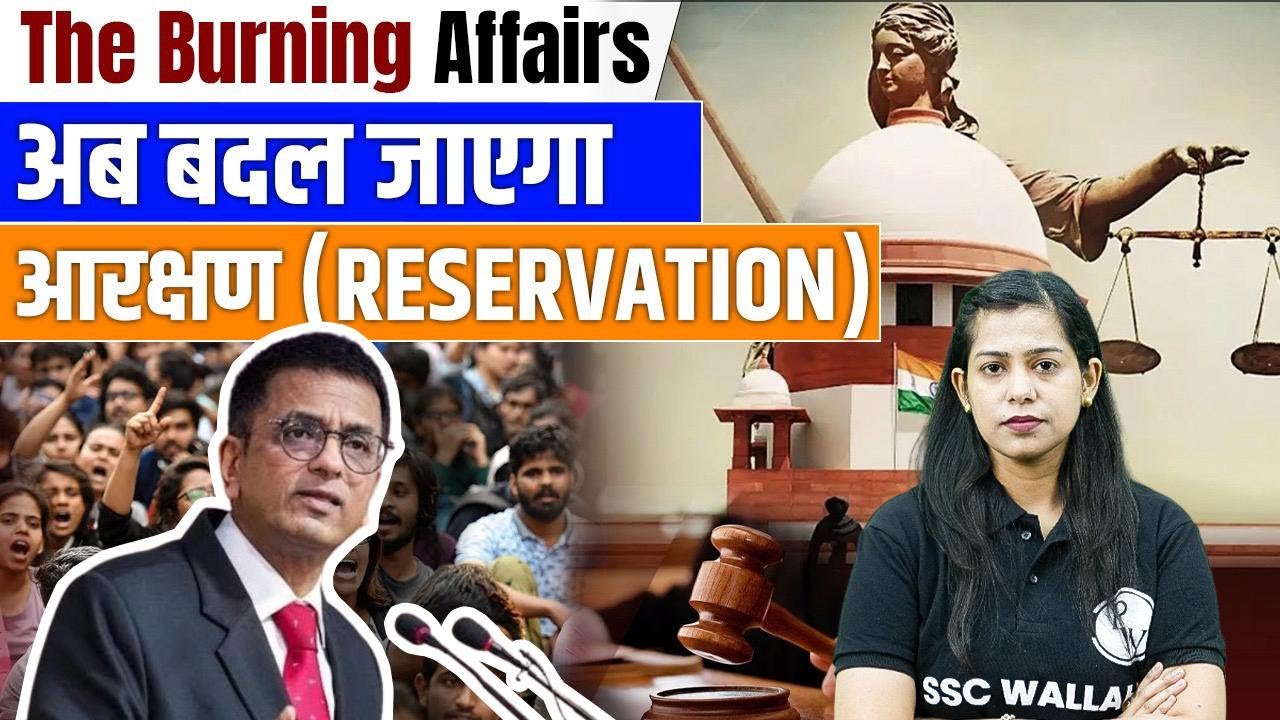Supreme Court Approves Sub-Classification for SCs and STs, Overrules 2004 Verdict | UPSC
Summary
TLDRThe Supreme Court of India has made a significant ruling on the reservation system for Scheduled Castes and Scheduled Tribes, overturning its own 20-year-old decision. The court has now allowed states to classify within these categories, potentially leading to more nuanced reservation policies. This decision stems from a case involving the Punjab government's 1975 notification dividing SC reservations into two categories. The ruling could lead to increased demands on state governments to redefine reservation policies, impacting educational institutions and public employment.
Takeaways
- 📜 The Supreme Court of India has made a significant ruling regarding the reservation for Scheduled Castes (SC) and Scheduled Tribes (ST), allowing for classification within these categories.
- 🔄 The court has reversed its own 20-year-old decision, indicating a shift in the interpretation of reservation policies.
- 🏛 The ruling was made by a seven-judge bench led by the Chief Justice of India, with a 6:1 majority in favor of allowing classification within SC and ST reservations.
- ⚖️ The decision potentially empowers state governments to further classify communities within the SC and ST categories for more targeted reservation benefits.
- 📉 There is a dissenting opinion by Justice Bela M. Trivedi, who opposed the majority ruling, arguing against the classification within reservations.
- 📚 Historical context is provided, highlighting the origin of the case from a 1975 notification by the Punjab government and its subsequent legal journey.
- 🛑 The Supreme Court's 2004 ruling had declared that SCs and STs are homogeneous groups for the purpose of reservations, a stance now altered by the new judgment.
- 🚫 The new ruling emphasizes that existing beneficiaries of reservations should not be excluded from these benefits due to reclassification.
- 📉 The impact of this judgment will be directly on state governments, which may now face demands to redefine reservation categories within SC and ST communities.
- 🔑 It is suggested that state governments will need to provide empirical data to justify any further classification within the reservations to ensure it addresses historical discrimination.
- 🗣️ The judgment invites public discourse and potentially legislative changes as states consider how to implement these new guidelines on reservations.
Q & A
What significant decision has been announced by the Supreme Court of India regarding reservations for Scheduled Castes and Scheduled Tribes?
-The Supreme Court of India has overturned its own 20-year-old decision, allowing states to classify within Scheduled Castes and Scheduled Tribes for reservations, which was previously not allowed.
What does the term 'homogeneous group' imply in the context of the Supreme Court's 2004 decision?
-The term 'homogeneous group' was used in the 2004 decision to imply that Scheduled Castes should be treated as a single group, not allowing for further classification within the group for reservations.
What was the initial stance of the Supreme Court in 2004 regarding the classification within Scheduled Castes for reservations?
-In 2004, the Supreme Court ruled that Scheduled Castes should be treated as a single homogeneous group and that states do not have the power to classify within Scheduled Castes for reservations.
What was the basis of the Punjab government's 1975 notification regarding reservation for Scheduled Castes?
-The Punjab government's 1975 notification divided the Scheduled Caste reservation into two categories, prioritizing the Valmiki and Mazhabi Sikh communities, which were considered the most economically and educationally backward within Punjab.
What was the issue with the Andhra Pradesh case that went to the Supreme Court in 2004?
-The issue was that Andhra Pradesh had created multiple categories within Scheduled Castes, providing different levels of reservation to various communities, which was declared unconstitutional by the Supreme Court.
What was the majority opinion of the seven-judge bench in the recent Supreme Court decision?
-The majority opinion of the seven-judge bench, led by the Chief Justice of India, was that states have the power to classify within Scheduled Castes and Scheduled Tribes for reservations.
What was the dissenting opinion of Justice Bela Trivedi in the recent Supreme Court decision?
-Justice Bela Trivedi dissented from the majority ruling, arguing against the power of states to classify within Scheduled Castes and Scheduled Tribes for reservations, stating it was beyond legislative power.
What is the potential impact of the Supreme Court's decision on state governments in India?
-The decision potentially empowers state governments to create more nuanced reservation policies within Scheduled Castes and Scheduled Tribes, leading to possible changes in the classification and allocation of reservations.
What was the Supreme Court's stance on the continuation of existing reservations for those already benefited by the system?
-The Supreme Court emphasized that those who have already benefited from reservations should not be excluded from future reservations, ensuring continuity and fairness in the system.
What is the historical context of the case that led to the recent Supreme Court decision?
-The case has a long history, starting with the Punjab government's 1975 notification, followed by a similar issue in Andhra Pradesh in 2004, and subsequent legal battles that led to the current review and decision by the Supreme Court.
How does the Supreme Court's decision relate to the fundamental right to equality as per the Indian Constitution?
-The Supreme Court's decision is tied to the fundamental right to equality as it aims to address historical discrimination and provide a more equitable distribution of reservation benefits among historically disadvantaged groups.
Outlines

此内容仅限付费用户访问。 请升级后访问。
立即升级Mindmap

此内容仅限付费用户访问。 请升级后访问。
立即升级Keywords

此内容仅限付费用户访问。 请升级后访问。
立即升级Highlights

此内容仅限付费用户访问。 请升级后访问。
立即升级Transcripts

此内容仅限付费用户访问。 请升级后访问。
立即升级浏览更多相关视频

Breaking News : Supreme Court Calls for Major Overhaul of SC/ST Reservation Policy | By Krati Mam

Proposes Exclusion of Creamy Layer Among SC/STs from Reservations | Know all about it | UPSC

2024 Important Legal Current Affairs | August 2024

*All IMPORTANT Constitutional Amendment for UPSC-PRE 2024 with PYQ 🤩🔥🔥#ias #upscpre2024 #prelims2024

Marcellus Williams execution set to happen in Missouri

The Supreme Court Case That Led to The Civil War | Dred Scott v. Sandford
5.0 / 5 (0 votes)
